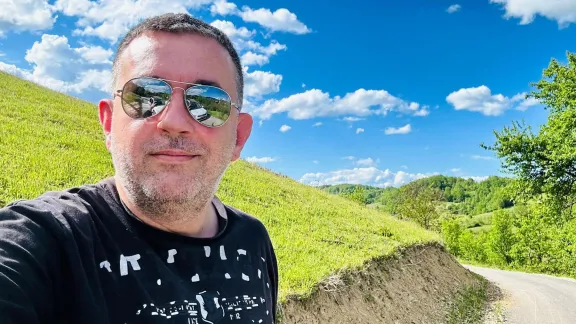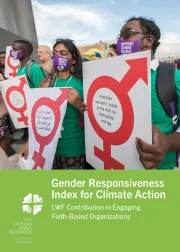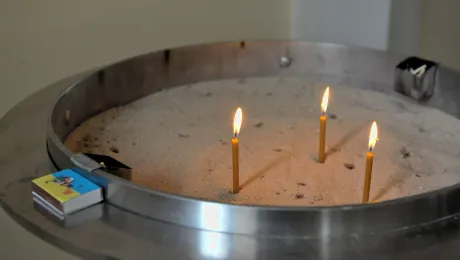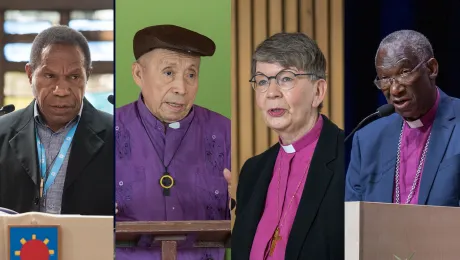
Bosnian journalist and humanitarian worker Senad Pirić. Photo: Private
Living as Neighbours: Senad Pirić, Bosnian journalist and humanitarian worker helping people on the move in Tuzla
(LWI) - “I believe if you do good to others, good will come back to you.” That conviction continues to motivate Bosnian journalist Senad Pirić, who has spent the past six years making friends and supporting people on the move in his native city, Tuzla.
An industrial city in eastern Bosnia and Herzegovina, close to the Serbian border, Tuzla is a key entry point for migrants and refugees hoping to cross into Europe via neighboring Croatia. In May 2018, Pirić was sent to cover the story of people arriving at the bus station, but he soon realized that they were in urgent need of basics such as food and water.
“I had been helping people who survived the genocide in Srebrenica, so it was normal for me to help these people too,” he says simply. Pirić shared his story in episode five of the ‘Living as Neighbours’ podcast, a joint initiative of the Lutheran World Federation and A World of Neighbours network.
War in Bosnia
Born in the city of Tuzla, Pirić was in his last year of junior school when the Bosnian war broke out. He still remembers the day in May 1992 when some of his Serbian friends disappeared from class and shooting started all around the town. “The Serbian army was everywhere, trying to cut the city in two,” he recalls. “Then the shelling and bombing began and for three and a half years, we often went without electricity or food, sometimes we couldn’t go to school.”
When the war ended, he says, he and his friends “felt like we had missed out on many things.” He trained as a journalist and worked for a while in Iraq. “I saw life in the West and wanted to go there but I couldn’t get a visa. I compare myself to the young Afghans and others now who want to come to Europe for a better life.”
After discovering the migrants sleeping on the bus station floor, Pirić went along each day, together with a handful of other volunteers who brought tents, sleeping bags, blankets and clothes. As the numbers of new arrivals grew, the police moved in to remove the improvised camp and by the winter of 2019, the Tuzla bus station had become an international news story. “We are a very hospitable nation, a mixed nation, so in the beginning people were welcoming. But when the police moved in, the hate speech started and many people blamed me,” he says.
Injustice gives me the power to act.
Bosnian journalist and humanitarian worker Senad Pirić
Today, Pirić has a warehouse at an undisclosed location with supplies for people who continue to arrive at the bus station, sometimes in their hundreds each day. Organizing support for them has taken its toll and he lost his job at the news portal. Since then, he has found other work, including a project bringing together Muslim and Serbian women to sell their produce and heal the wounds of the Balkan war.
“Sometimes it is just too much for me and I feel alone, especially at night. It is not easy when you bring a hundred problems home with you, but you can only solve a few of them,” Pirić explains. “But I am still here. Injustice gives me the power to act. I try to give people a normal life, to connect them with the community by going to coffee shops or concerts. I treat them like friends and many people understand that but there is still a lot of racism and hatred.”
Success stories
Despite the difficulties, he has managed to find work for a few of those staying for a longer time. He has also taken one of them to a local school to confront the fears and prejudice that children learn from their parents. When you make friendships, you hear lots of stories about people’s lives, their families,” he says. “We have educated people, doctors and engineers from Iran, but also people from Afghanistan who have seen their family members killed.”
Pirić recalls cases of children separated from their families, women suffering from the trauma of sexual abuse. He also recounts a few success stories, such as a Pakistani man who found work in Italy and returned to Tuzla to thank those who supported him on his journey. “From all these people, you can learn something,” Pirić insists. “You also never know what will happen in life: that’s why I don’t like it when people judge without listening to their stories.”
The Living as Neighbours podcast is a joint initiative of the Lutheran World Federation and A World of Neighbours network, which supports people helping migrants and refugees across the European continent. The project is supported by the German government through the Deutsche Gesellschaft für Internationale Zusammenarbeit. Each of the eight episodes features ordinary individuals doing extraordinary work to help the most vulnerable people stranded along some of Europe’s remotest borders.


